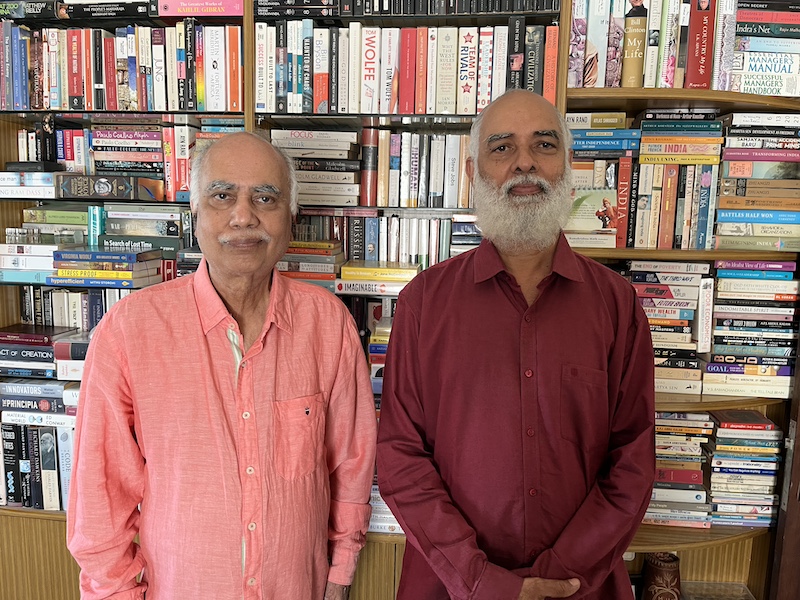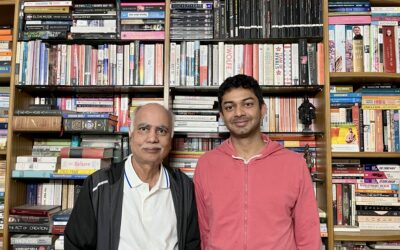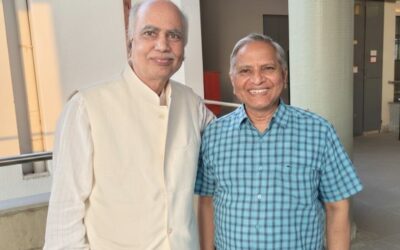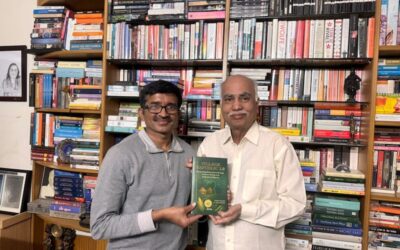
A Small Republic of Trust
It was a quiet forenoon when they arrived — father and son, two physicians bound by a lineage of service and an unspoken continuity between action and thought. The air outside was still, save for the occasional chirping of birds on my 14th-floor east-facing balcony. By noon, the sun had moved overhead, leaving the balcony in shade and pleasantly cool.
Dr Venkata Ratnam Vakkalanka sat opposite me, unhurried, his eyes clear, his presence light yet steady. There was no theatricality about him, no performance of virtue. Sagacious, with his white hair and beard, he spoke in simple sentences that carried the ring of lived truth — a rhythm as steady as his pulse.
He is about my age, and yet I felt, as we talked, that he had lived a life more centred, more certain of its course. He had chosen his orbit early and had remained within it — like a planet loyal to its sun. As he spoke, memories came flooding back — of Kakinada, that quiet coastal town I had been to ‘once upon a time’. A paradise of tranquil order, I had called it then — a place where life seemed to move with purpose yet without haste. It was easy to imagine him there, tending to his patients not merely as cases of sugar and blood pressure but as whole lives, luminous and complicated, each seeking equilibrium.
In a world where most young doctors fled toward neon cities and richer destinies, he had stayed behind. Not out of inertia, but out of faith — faith that one need not go far to serve greatly. His wife, Smt. Padmaja provided anchoring. His clinic, modest by city standards, had become a sanctuary for those who sought not miracles but understanding. He had turned medicine into dialogue, and dialogue into healing.
He spoke of diabetes — not with the mechanical certainty of textbooks but with the tenderness of a philosopher. “Diabetes,” he said, “is a rhythm gone astray. The human body is a system of balances — intake and expenditure, rest and effort, indulgence and restraint. When the rhythm is lost, disease enters. My task is not to overpower it with drugs but to guide the rhythm back.”
Remembering his guru, legendary diabetologist Dr M. Viswanathan in Chennai, he said, smiling gently, “I often tell my patients — Metformin is not a miracle, it is a foundation. It gives us a base to rebuild upon. But without discipline, without the steady pulse of daily practice, even the best medicine becomes futile.” Healing is never a technical fix but a repairing act — a restoration of harmony between man and his body, between desire and discipline. He believed that the truest medicine was awareness.
His son, Dr Sujit Vakkalanka, sat beside him — younger, thoughtful, with the stillness of one who has seen the world and carries both its promise and fatigue. Trained in the United States, he now stood poised at the threshold of a new frontier — that of using artificial intelligence to treat diabetes. He spoke softly, almost diffidently, of algorithms piggybacking on the mobile phone that could monitor energy intake and expenditure in real time, whisper gentle reminders when indulgence crept in, and make health a living dialogue between man and machine.
“The body always tells us everything,” he said. “We just don’t listen. AI could help us listen better.” It was a beautiful image — not of machines replacing wisdom but extending it. The father saw in his son’s vision the evolution of his own lifelong practice: what he had done through intuition, the son hoped to do through data. Between them stood not a generational divide but a bridge — one built of the same compassion, expressed in different tongues.
I asked Dr Vakkalanka whether he had ever regretted not leaving Kakinada for a larger city, such as Hyderabad. He shook his head slowly. “No,” he said. “A doctor’s work is not measured by where he practices but by how deeply he listens. My patients are my teachers. Many of them have gone elsewhere, yet they still come for consultation. I never felt the need to go elsewhere.” The sentence lingered between us like a benediction.
In that moment, I understood something rare: that staying is also a form of courage. In an age where ambition is defined by departure, to remain rooted is almost radical. Dr Vakkalanka had not chased success; he had cultivated meaning. In the quiet streets of Kakinada, he had built a small republic of trust. I remembered again that town — its symmetry, its discipline, the rhythm of its tides — and saw how his life mirrored its geography. The man and the place seemed woven from the same calm cloth.
We spoke of food, of sleep, of the unseen mathematics of metabolism. He believed that modern life’s tragedy was excess — not just of calories, but of noise, anxiety, distraction. “We live,” he said, “as though energy were infinite. But it is not. Whether physical or emotional, every indulgence must be balanced by stillness. The healthiest people are not those who do the most, but those who do enough.”
His words were less prescriptive than philosophical. I thought then how his son’s vision — AI monitoring our daily rhythm — was, at heart, an echo of the father’s teaching. The old wisdom clothed in new syntax. Awareness translated into code. Perhaps that is how knowledge evolves — one generation feels, the next measures. One listens to the pulse, the other to the data. Yet both, in the end, seek the same harmony. When they rose to leave, the air around me seemed lighter and the sunshine brighter.
In the night, in the brief spell before sleep takes over, the images of Kakinada returned — of its still waters and soft light. Dr Vakkalanka had embodied Kakinada: its tranquillity, its balance, its quiet assurance that service is richer than ambition. And through his son, that same spirit was finding its way into the circuitry of the future. Perhaps this is what it means to heal — to make the hidden rhythm visible again, whether in the bloodstream or in the algorithm, whether in a small town by the sea or on the luminous screen of a machine.
And perhaps, when the world grows too hurried, too indulgent, it will need more men like Dr Vakkalanka — those who stay, serve, and remind us that the healthiest system, human or digital, is the one that remembers to live in rhythm. Life, after all, is like the deep ocean: stillness rules its depths, holding treasures for those with the courage to dive deep. The world of families, communities, livelihoods, media, and other vanity fairs is like waves on the ocean surface: roaring, glittering, crashing, and vanishing — a fleeting display of entropy! But like there is always the enduring calm below, there is eternal immortality residing within all of us, witnessing the drama of our lives.
MORE FROM THE BLOG
From Disease to Wellness: Time for a Paradigm Shift
Modern medicine is magnificent at one thing: it rushes heroically to the battlefield after the war has already been lost. When the coronary artery is blocked, a stent is inserted. When the pancreas fails, insulin is administered. When cancer erupts, it deploys...
A Hero’s Journey of Taking Cognition Beyond Mortal Neurons
In an age mesmerised by rankings, metrics, and loud declarations of success, the most consequential journeys often unfold quietly. They are not propelled by brilliance alone, but by curiosity, humility, and an unyielding fidelity to truth. The exploration of...
Science, Service, and the Long Goodbye to Leprosy
It was already evening when they arrived, and I sensed a good feeling. The light had softened, retreating gently from the edges of objects, as though the day itself wished to listen to what came next. Dr. Gangadhar Sunkara came with Dr. Chinnababu Sunkavalli—both...




Serene narrative celebrating devotion, wisdom, continuity, and humility. Each sentence breathes compassion, illuminating medicine as philosophy, science as empathy, and heritage as harmony.
Arunji, Great Blog. Thank you for sharing. Great lesson in not moving from Kakinada with faith. Guiding patients to get back the rhythm which goes out of balance with the disease is fantastic approach.
The trust deficit in modern medicine is growing, not because doctors lack skill or compassion, but because the system around them has become opaque and transactional. Patients increasingly feel that clinicians are pushed into becoming agents of diagnostics, pharmaceutical marketing, and insurance-driven hospital protocols. When treatment begins to look more like a revenue cycle than a healing relationship, suspicion naturally arises. Restoring trust requires returning to the core covenant of medicine: transparent decisions, patient-centric care, and the moral courage to place human wellbeing above all commercial pressures. Nice to read about Dr Vakkalanka. My salute to him.
There is an urgent need for clinical practice to evolve beyond the ritual of chasing laboratory numbers. Too often, treatment becomes a game of adjusting parameters on a report rather than understanding the human standing behind it. Lab values are tools — not truths. They can mislead, trigger anxiety, and create a diagnosis-first mindset where fear replaces judgment and protocol replaces wisdom. Human physiology is dynamic, adaptive, and deeply influenced by context, lifestyle, emotion, and environment. True medicine is not surveillance of biomarkers but stewardship of balance. Clinicians must return to systemic care — listening to the body, observing the person, and treating patterns, not panels; causes, not consequences. When we heal systems rather than fix numbers, we give patients not just longer lives, but fuller ones.
Modern medicine has achieved miracles — but somewhere along the way, it began to behave more like an industry than a healing science. We started treating the human body as a machine and diseases as repair jobs, forgetting that life is not a set of broken parts but an interconnected system of energy, emotion, environment, and purpose. True health is not the absence of symptoms; it is the harmonious flow of life. The future of medicine must return to this understanding — where physicians are not just technicians fixing malfunctioning organs, but guides nurturing vitality, preventing breakdowns, restoring balance, and treating the human being as an ecosystem, not an engine. When medicine remembers life, not disease, healing becomes natural — and health becomes our birthright, not a market. Hats off to Dr Venkata Ratnam Vakkalanka!
Dear Sir, let us celebrate and honour the doctors who choose to stay back in towns and districts, serving not just patients, but families, communities, and futures. They are the quiet guardians of public health — often without spotlight, resources, or glamour — yet they stand as the first and strongest line of defence against chronic disease.
Conditions like diabetes and hypertension, when detected early and managed with care, do not have to steal years or damage lives. It is in these local clinics and everyday consultations that the seeds of long-term wellness are planted. Prevention, patient education, and sustained lifestyle support begin not in big hospitals, but in the hearts and hands of these committed physicians.
To every doctor who builds trust instead of chasing titles, who chooses service over convenience, and who strengthens the health of a nation one patient at a time — thank you. Your work may be quiet, but its impact echoes across generations.
Dear Sir, Greetings! A profoundly inspiring reflection, Sir. Your words capture the quiet dignity of those who choose purpose over prestige — staying rooted where they are most needed rather than chasing distant horizons.
Reading about Dr Vakkalanka reminded me deeply of my brother, Dr Radha Raman, a Plastic Surgeon from PGI Chandigarh and now Head of Department at SKMCH, Muzaffarpur. He, too, had the opportunity to go abroad but chose to serve the people of his hometown, bringing advanced surgical care to those who might otherwise never have access to it. Like Dr Vakkalanka, he embodies that rare courage of ‘staying,’ turning medicine into a dialogue of trust and compassion. Your phrase ‘a small republic of trust’ perfectly describes such lives — where service becomes both the means and the message. Thank you for illuminating this truth so tenderly. Warm Regards.
Indeed Prof Tiwari, The healthiest system, human or digital, is the one that remembers to live in rhythm. Life, after all, is like the deep ocean: stillness rules its depths, holding treasures for those with the courage to dive deep. The world of families, communities, livelihoods, media, and other vanity fairs is like waves on the ocean surface: roaring, glittering, crashing, and vanishing — a fleeting display of entropy! May we find useful lessons in this reflection
Thanks Arunji. Such a simple, grounded, and humbling story — really refreshing to see someone choose to make a deeper, quieter impact in their own hometown instead of chasing success elsewhere. It reminds us what real contribution looks like. The part that stayed with me was — “When the rhythm is lost, disease enters. My task is not to overpower it with drugs but to guide the rhythm back”. So much wisdom in that one line.
Arunji, Nice narration — gentle, profound, and deeply humane. Your portrayal of Dr Vakkalanka and his son captures not just their work but the quiet dignity that comes from a life of purpose and balance. The contrast and continuity between father and son — wisdom and innovation, intuition and intelligence — are expressed with such grace. I was especially moved by the line, “staying is also a form of courage.” Thank you for reminding us that meaning often lies not in movement, but in rootedness. Warm Regards!
Wow!
Beautiful description of a profound meaning in life – trust and service.
Thanks for sharing!
Sir, thanks for such an informative divine blog. Dr VR Vakkalanka and Dr Sujit both are wonderful doctors treating the community suffering most by diabetes, carries the profession from the generations. This is the real service to the community. Dr VRV is real doctor considering the patient as a teacher, au salute him for such type of thoughts. I wish him and his son best wishes for their passion and profession.